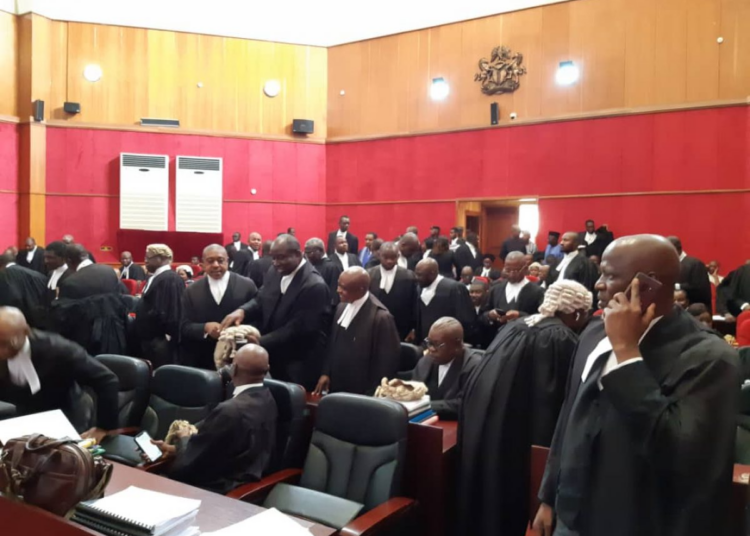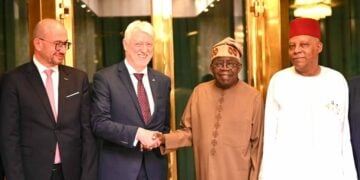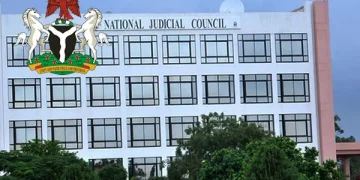A renowned legal practitioner, Barr. Chukwudi Ezike, has stated that the judgement of the Enugu State Governorship Election Petitions Tribunal, which affirmed Peter Mbah as the duly-elected governor, was made in total disregard to the constitution and precedents set by the Supreme Court.
He described as a travesty of justice a situation where the court decided in favour of someone who is in clear violation of the letters of section 182 (1)(j) of the Constitution, citing several Supreme Court judgements to buttress his arguments.
He said it was wrong for the court to equally rule that a petitioner has to produce a certificate he did not make or describing evidences of witnesses subpoenaed by the courts as incompetent, because the witness statements were not filed at the time the petition was first submitted at the court.
A three-member panel of judges headed by Justice Kudirat Akano, had on September 21st, dismissed all the grounds of the petition filed by the Labour Party gubernatorial candidate in the state, Hon Chijioke Edeoga, against the declaration of Mbah of the Peoples Democratic Party (PDP), as winner by the Independent National Electoral Commission (INEC).
According to Barr. Ezike, “in the case of Agi vs PDP, the Supreme Court had defined forgery as bringing or presenting or attaching or submitting a document not made by the agency which is purported to have made such a document.
“In proof of this leg of the petition, Hon. Edeoga and the LP, petitioners at the Tribunal, called five witnesses which included a Director from the National Youth Service Corps (NYSC) in-charge of Corps Certification and a Managing Partner of a law firm, who applied to the NYSC under the Freedom of Information Act, to verify the authenticity of the NYSC certificate which Peter Mbah, the governorship candidate of the PDP presented to INEC.”
The tribunal at page 103 of the judgment summarises the evidence of the five witnesses of the petitioners thus: “The testimony of the petitioners witnesses who testified in support of this ground that is PW1 (the NYSC Director, Corps Certification), PW2 (Mrs. Mary Nneoma Elijah, the lawyer who wrote to the NYSC to verified the alleged certificate), PW3, Pw4, Pw26 and Pw30 to the effect that the 2nd respondent’s (Mbah’s) NYSC Certificate No A808297, is forged as same was not issued to him by the issuing authority, that is NYSC, on the ground that he did not complete the mandatory one year programme.”
The finding of the tribunal that the said forged certificate was not submitted in aid of the qualification of Mr. Mbah to contest election, is not what the law and the Supreme Court says.
“The other leg of the judgment that NYSC certificate is not a requirement to contest governorship election or that both the forged and the original document must be presented before the court, is pure travesty of justice.
“The court was also wrong to hold that the said NYSC certificate having not been referred to in the Form EC9, affidavit of personal particulars, is therefore a merely attached document and shall be of no consequence to the qualification of the 2nd respondent, is a wrong legal finding”, he said.
Barr. Ezike added: “Section 177 of the constitution provides the qualification for the contest of the governorship election in Nigeria.
“Anybody who is qualified under section 177 can be disqualified under section 182(1) if he is culpable of (j), presented a forged certificate to the INEC”.
“Simplified, section 182 says that presentation of forged certificate by any candidate of any political party for the purpose of contest of governorship election in Nigeria will be disqualified, not withstanding that the person is qualified under section 177 of the constitution”.
He added that a candidate who approaches the court under such a ground cannot be deemed to be pursuing a pre-election issue for two reasons that only candidate, not aspirants, contest elections and so, they would only have issues to contest when they submit to INEC for an electoral contest.
“The Supreme Court in the case of Ucha v. Onwe (2011) ALL FWLR (PT 580) 1227 @ 1295, (2011) 4 NWLR (PT 1237) 386 @ 427, which is similar to the Edeoga vs Mbah case, upheld the provision of Section 66(1) (h) of the 1999 Constitution as a disqualifying factor, and it says it all.
“Sub-paragraph (h) did not classify the type of forged certificate that can disqualify a candidate.
“The Tribunal therefore cannot be right in its finding that the NYSC Certificate is not envisaged in Section 66(1)(h) of the 1999 Constitution.
“Counsel and the Courts, as the Apex Court (Nnaemeka-Agu, JSC) admonished in Ojibah v. Ojibah (1991) 6 S.C. 182; (1991) 6 SCNJ 156, (1991) LPELR- SC. 128/1988, should avoid the temptation of relying on ‘the established legal jingles and catch-phrases’, without fully asking how well they fit into the particular facts of their cases”.
He added that the facts of the case of Oke V. Mimiko heavily relied by the tribunal to arrive at its decision that evidence of subpoenaed witness must accompany the petition is distinguishable with the facts of the case under review and cannot stand on appeal.
Barr. Ezike said the next leg of the case which is that the result of the election in 20 polling units in Igbo-Eze North and Udenu local government areas alleged to be wrongly computed in favour of the PDP and against the LP, the court should have analysed the figured entered in Forms EC8A and EC8B and calculations presented, rather than dismiss the testimony of ward collation agents as not being fit to testify on the polling unit result because the witness did not sign the polling unit results.
“The decision of the Tribunal rejecting the evidence of the rest of the witnesses called to prove the miscalculation of results in the rest of the polling units and the document tendered through them is a violation of Section 60 of the Electoral Act and paragraph 50 of the INEC Regulation and Guideline for the conduct of election 2022.
“The introduction of BVAS in our electoral system, section 137 of the Electoral Act 2022 came to cure the requirement of oral evidence in proof of infraction of the Electoral Act, such as over voting and the rest.
“Also, Order 3 Rule 3 (1) of the Civil Procedure Rules of the Federal High Court and Paragraph 4 (5) of the 1st Schedule to the Evidence 4 of 6,206 Act are in all fours to serve the same purpose.”





